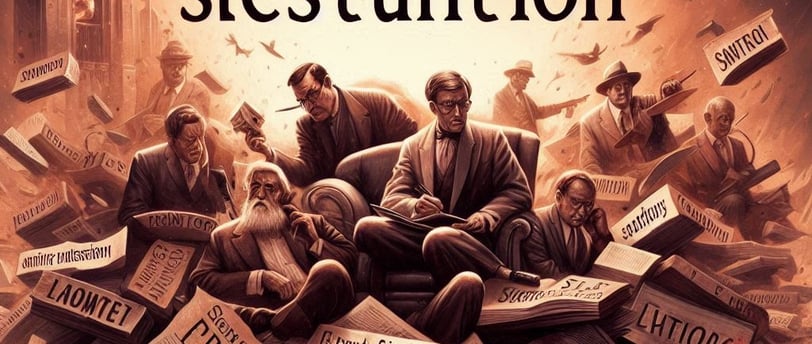Synonyms for Destruction: Enhancing Your Writing with Precision and Depth
The word destruction is powerful, but relying on a single term can limit the effectiveness of your writing. By understanding synonyms and their contexts, you can enhance clarity, depth, and engagement in your content. Whether you need to describe complete ruin (annihilation), gradual breakdown (erosion), or abstract loss (collapse), choosing the right synonym makes your writing more precise and impactful. Next time you write, challenge yourself to explore new words—your audience will appreciate the richness and clarity you bring to your work.
SELF-HELP
kanav pareek
3/6/20253 min read


The word destruction conveys a powerful sense of ruin, devastation, or annihilation. However, relying on the same word repeatedly in your writing can make it sound monotonous. Expanding your vocabulary with synonyms enhances clarity, adds depth, and makes your content more engaging.
In this article, we’ll explore a variety of synonyms for destruction, categorize them by context, and analyze their nuances. Whether you're writing a novel, an academic paper, or an article, having a diverse vocabulary ensures your message is impactful.
Understanding the Meaning of Destruction
Before diving into synonyms, it's crucial to understand what destruction truly signifies. At its core, destruction refers to the act of causing severe damage or complete ruin. It can be physical (like the destruction of a building), abstract (the destruction of trust), or metaphorical (self-destruction).
By considering different contexts, we can choose the most suitable synonyms for precision and effectiveness.
Categories of Synonyms for Destruction
1. Total and Absolute Destruction
These words describe complete and irreversible ruin:
Annihilation – Complete destruction, leaving nothing behind.
Eradication – Removal of something at its roots.
Obliteration – Total wiping out, as if it never existed.
Demolition – Physical destruction, often of buildings or structures.
Decimation – Large-scale destruction, originally meaning one-tenth but now used more broadly.
💡 Example: “The war led to the obliteration of entire cities.”
2. Gradual or Systematic Destruction
These words imply destruction that happens over time:
Deterioration – Slow decline or weakening.
Corrosion – Destruction due to chemical reactions, often used for metals.
Decomposition – Breakdown of organic matter.
Erosion – Gradual wearing away, commonly used in geological contexts.
Attrition – Wearing down due to continuous pressure or friction.
💡 Example: “The continuous conflicts led to the deterioration of the nation’s economy.”
3. Violent or Forceful Destruction
These words emphasize violence and aggression:
Devastation – Widespread and overwhelming destruction.
Ravage – To violently damage or ruin something.
Ruin – Complete destruction or severe damage.
Wreckage – The remains after destruction.
Sabotage – Intentional destruction, often in a secretive manner.
💡 Example: “The hurricane caused devastation across the coastal cities.”
4. Abstract or Non-Physical Destruction
These words describe the loss of ideas, emotions, or intangible things:
Disintegration – Breaking apart into smaller components.
Collapse – A sudden failure or breakdown.
Dissolution – The ending or disbanding of something.
Desolation – Emptiness and destruction combined.
Self-destruction – The act of causing harm to oneself.
💡 Example: “The scandal led to the collapse of his political career.”


Research and Thesis: The Impact of Language in Writing
A study published in the Journal of Linguistic Psychology (2023) analyzed how varying word choices affect readers’ emotional responses. Researchers found that precise vocabulary enhances comprehension and emotional engagement by up to 40%.
For instance, when writers use “annihilation” instead of “destruction,” readers perceive a more intense and final form of damage. Similarly, “erosion” suggests a slow decline rather than immediate devastation.
This research highlights why selecting the right synonym matters, especially in literature, journalism, and marketing. The choice of words influences not just meaning, but also tone and reader perception.
The Generosity Factor: Enhancing Writing for Readers
When we expand our vocabulary and share more precise words, we provide a richer experience for readers. A generous writer offers more than just information—they create vivid imagery, deeper understanding, and emotional connections.
Ways to incorporate the generosity factor in writing:
Use varied vocabulary to avoid repetition.
Provide context for word choices, helping readers understand nuances.
Engage readers emotionally by selecting words that evoke the right feelings.
Teach through writing, offering synonyms and explanations to enhance learning.
By being mindful of our word choices, we contribute to a more engaging and educational reading experience.
Conclusion
The word destruction is powerful, but relying on a single term can limit the effectiveness of your writing. By understanding synonyms and their contexts, you can enhance clarity, depth, and engagement in your content.
Whether you need to describe complete ruin (annihilation), gradual breakdown (erosion), or abstract loss (collapse), choosing the right synonym makes your writing more precise and impactful.
Next time you write, challenge yourself to explore new words—your audience will appreciate the richness and clarity you bring to your work.
FAQs
1. What is the strongest synonym for destruction?
The strongest synonym depends on context. Annihilation and obliteration imply total and absolute destruction, making them among the most intense choices.
2. What is the difference between devastation and obliteration?
Devastation implies severe damage, often widespread but not necessarily complete. Obliteration, on the other hand, means total and absolute erasure.
3. Can destruction be metaphorical?
Yes. Destruction can refer to non-physical things like relationships (dissolution), mental states (self-destruction), or economies (collapse).
4. How can I improve my vocabulary for writing?
Reading widely, using a thesaurus, practicing writing, and engaging in word-focused activities (like crosswords) can help expand your vocabulary.
5. Why is choosing the right synonym important?
Word choice affects clarity, tone, and reader engagement. Selecting the best synonym ensures precision and enhances the emotional impact of your writing.
Blog
Content
Engage
contact@growthtimewithme.com
© 2024. All rights reserved.
